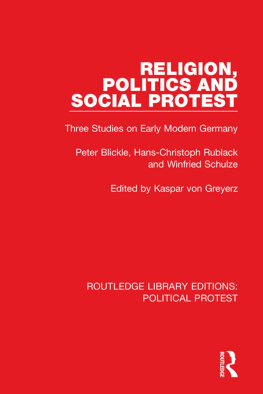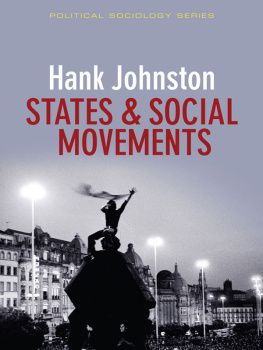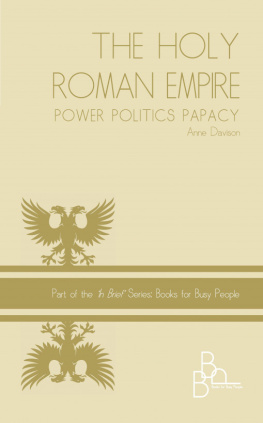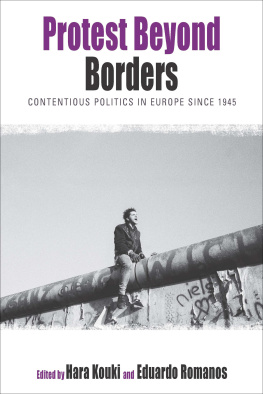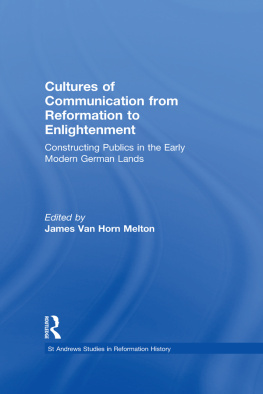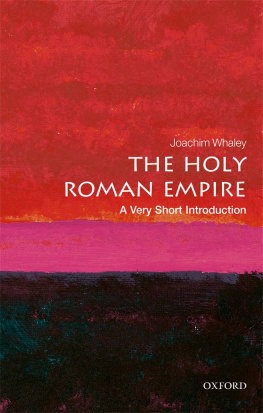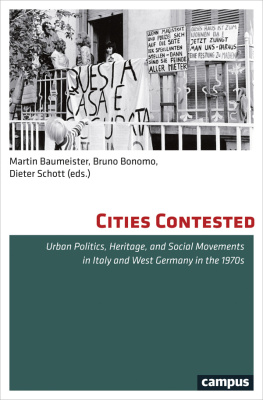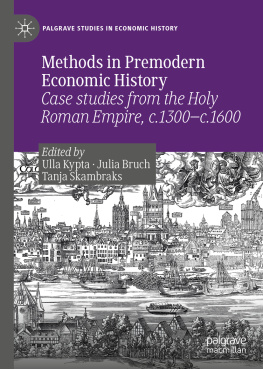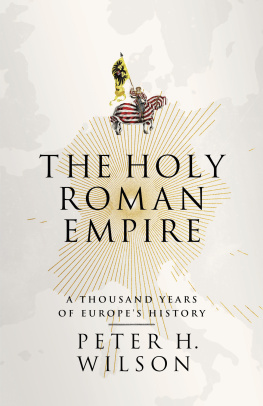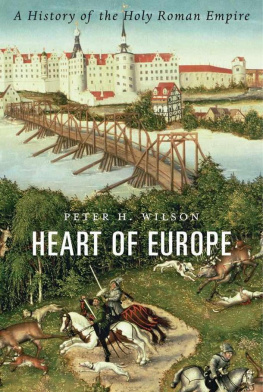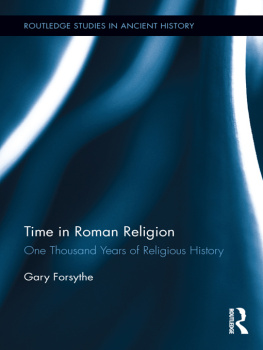ROUTLEDGE LIBRARY EDITIONS: POLITICAL PROTEST
Volume 19
RELIGION, POLITICS AND SOCIAL PROTEST
RELIGION, POLITICS AND SOCIAL PROTEST
Three Studies on Early Modern Germany
PETER BLICKLE, HANS-CHRISTOPH RUBLACK AND WINFRIED SCHULZE
First published in 1984 by George Allen & Unwin (Publishers) Ltd
This edition first published in 2022
by Routledge
2 Park Square, Milton Park, Abingdon, Oxon OX14 4RN
and by Routledge
605 Third Avenue, New York, NY 10158
Routledge is an imprint of the Taylor & Francis Group, an informa business
1984 German Historical Institute
All rights reserved. No part of this book may be reprinted or reproduced or utilised in any form or by any electronic, mechanical, or other means, now known or hereafter invented, including photocopying and recording, or in any information storage or retrieval system, without permission in writing from the publishers.
Trademark notice: Product or corporate names may be trademarks or registered trademarks, and are used only for identification and explanation without intent to infringe.
British Library Cataloguing in Publication Data
A catalogue record for this book is available from the British Library
ISBN: 978-1-03-203038-8 (Set)
ISBN: 978-1-00-319086-8 (Set) (ebk)
ISBN: 978-1-03-204967-0 (Volume 19) (hbk)
ISBN: 978-1-03-204971-7 (Volume 19) (pbk)
ISBN: 978-1-00-319538-2 (Volume 19) (ebk)
DOI: 10.4324/9781003195382
Publishers Note
The publisher has gone to great lengths to ensure the quality of this reprint but points out that some imperfections in the original copies may be apparent.
Disclaimer
The publisher has made every effort to trace copyright holders and would welcome correspondence from those they have been unable to trace.
Religion, Politics and Social Protest
Three Studies on Early Modern Germany
PETER BLICKLE
HANS-CHRISTOPH RUBLACK
WINFRIED SCHULZE
Edited by
Kaspar von Greyerz
With an Introduction by
Wolfgang J. Mommsen
German Historical Institute 1984
This book is copyright under the Berne Convention. No reproduction without permission. All rights reserved.
George Allen & Unwin (Publishers) Ltd,
40 Museum Street, London WC1A 1LU, UK
George Allen & Unwin (Publishers) Ltd,
Park Lane, Hemel Hempstead, Herts HP2 4TE, UK
Allen & Unwin, Inc.,
9 Winchester Terrace, Winchester, Mass. 01890, USA
George Allen & Unwin Australia Pty Ltd,
8 Napier Street, North Sydney, NSW 2060, Australia
First published in, 1984
British Library Cataloguing in Publication Data
Blickle, Peter
Religion, politics and social protest.
1. ReformationGermany
I. Title II. Rublack, Hans Christoph
III. Schulze, Winfried
274.306 BR305.2
ISBN 0-04-940077-0
Library of Congress Cataloguing in Publication Data
Blickle, Peter.
Religion, politics, and social protest.
Based on papers given in seminars at the German
Historical Institute in 1980.
Includes bibliographical references and index.
1. ReformationGermanyAddresses, essays, lectures.
2. Social movementsGermanyHistory16th century
Addresses, essays, lectures. 3. GermanySocial conditions
Addresses, essays, lectures. 4. Germany
Politics and government1517-1648Addresses, essays, lectures.
I. Rublack, Hans-Christoph. II. Schulze, Winfried.
III. Greyerz, Kaspar von. IV. German
Historical Institute of London.
BR307.B54 1984 943'.03 84-10963
ISBN 0-04-940077-0 (alk. paper)
Set in 11 on 13 point Garamond by V & M Graphics Ltd, Aylesbury and printed in Great Britain by Nene Litho and bound by Woolnough Bookbinding both of Wellingborough, Northants
Contents
Introduction
Wolfgang J. Mommsen
Peter Blickle
2 Political and Social Norms in Urban Communities in the Holy Roman Empire
Hans-Christoph Rublack
3 Peasant Resistance in Sixteenth- and Seventeenth-Century Germany in a European Context
Winfried Schulze
Wolfgang J. Mommsen
The three studies by Peter Blickle, Hans-Christoph Rublack and Winfried Schulze collected in this volume have one theme in common, namely the social impact of the Reformation on German and other European societies in the sixteenth and seventeenth centuries. They represent important threads in current research in the Federal Republic of Germany on the social history of early modern Europe. The studies emerged from papers originally given in seminars at the German Historical Institute in 1980. While all three authors have published widely in German on the social history of the Reformation and German peasant revolts, British readers may not be as familiar with their work. Thus the German Historical Institute decided to publish these essays which provide a most informative insight into the views, research strategies and approaches currently dominant in the Federal Republic of Germany in this particular field of research. The German Historical Institute hopes to publish similar collections of essays on other topics of general interest in the near future; a collection of essays on the Holocaust is currently in preparation. It is to be hoped that in this way the German Historical Institute can help to promote the co-operation between British and German historical research.
The essay by Peter Blickle on Social protest and Reformation theology argues with much justification that the theology of the Reformation and the ideologies of the various social protest movements which began during that period had, in fact, much in common, whatever the theologians felt about it, and that one cannot be understood without the other. Blickle masterfully outlines an ideal-typical pattern of both urban and rural protest movements during the Reformation and points out in some detail how intimately connected they were to the theological teachings of the Reformation preachers. Social protest in its various forms was justified by contemporaries, albeit in very different ways, as based upon what they considered the only legitimate interpretation of the gospel. In this way Blickle succeeds in establishing a systematic link between the theology and the social protest movements of the time. Though in the end they were mostly suppressed, they made a lasting impact upon early modern society in Germany.
Hans-Christoph Rublacks essay on Political and social norms in urban communities in the Holy Roman Empire tackles a wider theme, namely the fundamental norms of German society before and during the Reformation, that is to say, the value principles which not only legitimised the social fabric as such, but also served as guidelines for social action throughout. Rublack does so on a rather sophisticated, abstract level, relying to a considerable degree upon sociological conceptualisations. In a way, his theme is a corollary to Blickles. He agrees with Blickle that the Reformation released enormous energies which tended to disrupt the traditional socio-political fabric of society, but he is concerned with the fact that most of the fundamental value norms of the age, particularly those with an integrative content, did survive. These were invoked to preserve the cohesion of society in the face of disruptive forces. Rublack emphasises three of them, the ideas of

